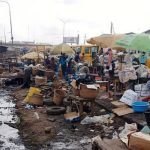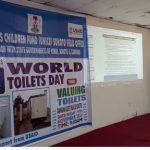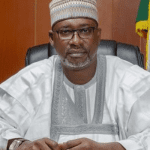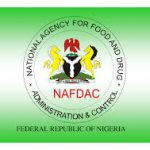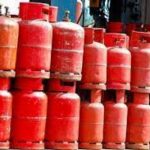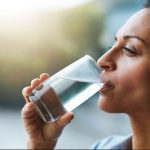An international non-governmental organisation, WaterAid Nigeria, has said that 50 per cent of all schools in Nigeria do not have basic water and sanitation facilities.
According to the organisation, this implies that the brunt of challenge of poor access is borne by people in the lowest economic rung and those living in rural areas and small towns.
Country Director of WaterAid Nigeria, Dr. ChiChi Aniagolu-Okoye, disclosed this during the unveiling of a report which analysed the situation of sanitation in Kano, Warri and Enugu state, in Abuja, on Wednesday.
“This poor access has significant implications on education, health and developmental outcomes. For instance, Nigeria loses 60, 000 children under the age of five yearly to diarrhoeal diseases caused by poor access to water and sanitation.
“Poor water supply and sanitation also costs the Nigerian economy 1.3 per cent of its gross domestic product which is about $4.8 million annually.
“Nigeria is also experiencing rapid urbanisation which is putting further strain on an already inadequate wash infrastructure,” She said.
The country director said that the study was conducted to provide insights into the key barriers and opportunities in expanding exclusive sanitation access and the management of human waste across the sanitation value chain.
“The study is part of WaterAid’s commitment to supporting states and cities to utilise the window of the National Action Plan (NAP) in improving access to safely managed and inclusive sanitation services,” she said.
Minister of Water Resources, Suleiman Adamu, in his remarks, said that only 20 per cent of people living in urban areas have access to basic water, sanitation and hygiene services.
Adamu, who was represented by the Director, Water Quality Control in the ministry, Emmanuel Awe, said that Nigeria had not performed well on the sustainable development goals (SDGs) six for water and sanitation.
“Goal six of the united nations sustainable development goals (SDGs) is focused on ensuring an inclusive and equitable access to safe and affordable drinking water, sanitation and hygiene for all and ending open defecation however it is unfortunate to state here that Nigeria have not performed so well on the target and basic indicators.
“Only 20% of Nigerians living in urban areas have access to basic wash services,” the minister said.
An international non-governmental organisation, WaterAid Nigeria, has said that 50 per cent of all schools in Nigeria do not have basic water and sanitation facilities.
According to the organisation, this implies that the brunt of challenge of poor access is borne by people in the lowest economic rung and those living in rural areas and small towns.
Country Director of WaterAid Nigeria, Dr. ChiChi Aniagolu-Okoye, disclosed this during the unveiling of a report which analysed the situation of sanitation in Kano, Warri and Enugu state, in Abuja, on Wednesday.
“This poor access has significant implications on education, health and developmental outcomes. For instance, Nigeria loses 60, 000 children under the age of five yearly to diarrhoeal diseases caused by poor access to water and sanitation.
“Poor water supply and sanitation also costs the Nigerian economy 1.3 per cent of its gross domestic product which is about $4.8 million annually.
“Nigeria is also experiencing rapid urbanisation which is putting further strain on an already inadequate wash infrastructure,” She said.
The country director said that the study was conducted to provide insights into the key barriers and opportunities in expanding exclusive sanitation access and the management of human waste across the sanitation value chain.
“The study is part of WaterAid’s commitment to supporting states and cities to utilise the window of the National Action Plan (NAP) in improving access to safely managed and inclusive sanitation services,” she said.
Minister of Water Resources, Suleiman Adamu, in his remarks, said that only 20 per cent of people living in urban areas have access to basic water, sanitation and hygiene services.
Adamu, who was represented by the Director, Water Quality Control in the ministry, Emmanuel Awe, said that Nigeria had not performed well on the sustainable development goals (SDGs) six for water and sanitation.
“Goal six of the united nations sustainable development goals (SDGs) is focused on ensuring an inclusive and equitable access to safe and affordable drinking water, sanitation and hygiene for all and ending open defecation however it is unfortunate to state here that Nigeria have not performed so well on the target and basic indicators.
“Only 20% of Nigerians living in urban areas have access to basic wash services,” the minister said.
An international non-governmental organisation, WaterAid Nigeria, has said that 50 per cent of all schools in Nigeria do not have basic water and sanitation facilities.
According to the organisation, this implies that the brunt of challenge of poor access is borne by people in the lowest economic rung and those living in rural areas and small towns.
Country Director of WaterAid Nigeria, Dr. ChiChi Aniagolu-Okoye, disclosed this during the unveiling of a report which analysed the situation of sanitation in Kano, Warri and Enugu state, in Abuja, on Wednesday.
“This poor access has significant implications on education, health and developmental outcomes. For instance, Nigeria loses 60, 000 children under the age of five yearly to diarrhoeal diseases caused by poor access to water and sanitation.
“Poor water supply and sanitation also costs the Nigerian economy 1.3 per cent of its gross domestic product which is about $4.8 million annually.
“Nigeria is also experiencing rapid urbanisation which is putting further strain on an already inadequate wash infrastructure,” She said.
The country director said that the study was conducted to provide insights into the key barriers and opportunities in expanding exclusive sanitation access and the management of human waste across the sanitation value chain.
“The study is part of WaterAid’s commitment to supporting states and cities to utilise the window of the National Action Plan (NAP) in improving access to safely managed and inclusive sanitation services,” she said.
Minister of Water Resources, Suleiman Adamu, in his remarks, said that only 20 per cent of people living in urban areas have access to basic water, sanitation and hygiene services.
Adamu, who was represented by the Director, Water Quality Control in the ministry, Emmanuel Awe, said that Nigeria had not performed well on the sustainable development goals (SDGs) six for water and sanitation.
“Goal six of the united nations sustainable development goals (SDGs) is focused on ensuring an inclusive and equitable access to safe and affordable drinking water, sanitation and hygiene for all and ending open defecation however it is unfortunate to state here that Nigeria have not performed so well on the target and basic indicators.
“Only 20% of Nigerians living in urban areas have access to basic wash services,” the minister said.
An international non-governmental organisation, WaterAid Nigeria, has said that 50 per cent of all schools in Nigeria do not have basic water and sanitation facilities.
According to the organisation, this implies that the brunt of challenge of poor access is borne by people in the lowest economic rung and those living in rural areas and small towns.
Country Director of WaterAid Nigeria, Dr. ChiChi Aniagolu-Okoye, disclosed this during the unveiling of a report which analysed the situation of sanitation in Kano, Warri and Enugu state, in Abuja, on Wednesday.
“This poor access has significant implications on education, health and developmental outcomes. For instance, Nigeria loses 60, 000 children under the age of five yearly to diarrhoeal diseases caused by poor access to water and sanitation.
“Poor water supply and sanitation also costs the Nigerian economy 1.3 per cent of its gross domestic product which is about $4.8 million annually.
“Nigeria is also experiencing rapid urbanisation which is putting further strain on an already inadequate wash infrastructure,” She said.
The country director said that the study was conducted to provide insights into the key barriers and opportunities in expanding exclusive sanitation access and the management of human waste across the sanitation value chain.
“The study is part of WaterAid’s commitment to supporting states and cities to utilise the window of the National Action Plan (NAP) in improving access to safely managed and inclusive sanitation services,” she said.
Minister of Water Resources, Suleiman Adamu, in his remarks, said that only 20 per cent of people living in urban areas have access to basic water, sanitation and hygiene services.
Adamu, who was represented by the Director, Water Quality Control in the ministry, Emmanuel Awe, said that Nigeria had not performed well on the sustainable development goals (SDGs) six for water and sanitation.
“Goal six of the united nations sustainable development goals (SDGs) is focused on ensuring an inclusive and equitable access to safe and affordable drinking water, sanitation and hygiene for all and ending open defecation however it is unfortunate to state here that Nigeria have not performed so well on the target and basic indicators.
“Only 20% of Nigerians living in urban areas have access to basic wash services,” the minister said.
An international non-governmental organisation, WaterAid Nigeria, has said that 50 per cent of all schools in Nigeria do not have basic water and sanitation facilities.
According to the organisation, this implies that the brunt of challenge of poor access is borne by people in the lowest economic rung and those living in rural areas and small towns.
Country Director of WaterAid Nigeria, Dr. ChiChi Aniagolu-Okoye, disclosed this during the unveiling of a report which analysed the situation of sanitation in Kano, Warri and Enugu state, in Abuja, on Wednesday.
“This poor access has significant implications on education, health and developmental outcomes. For instance, Nigeria loses 60, 000 children under the age of five yearly to diarrhoeal diseases caused by poor access to water and sanitation.
“Poor water supply and sanitation also costs the Nigerian economy 1.3 per cent of its gross domestic product which is about $4.8 million annually.
“Nigeria is also experiencing rapid urbanisation which is putting further strain on an already inadequate wash infrastructure,” She said.
The country director said that the study was conducted to provide insights into the key barriers and opportunities in expanding exclusive sanitation access and the management of human waste across the sanitation value chain.
“The study is part of WaterAid’s commitment to supporting states and cities to utilise the window of the National Action Plan (NAP) in improving access to safely managed and inclusive sanitation services,” she said.
Minister of Water Resources, Suleiman Adamu, in his remarks, said that only 20 per cent of people living in urban areas have access to basic water, sanitation and hygiene services.
Adamu, who was represented by the Director, Water Quality Control in the ministry, Emmanuel Awe, said that Nigeria had not performed well on the sustainable development goals (SDGs) six for water and sanitation.
“Goal six of the united nations sustainable development goals (SDGs) is focused on ensuring an inclusive and equitable access to safe and affordable drinking water, sanitation and hygiene for all and ending open defecation however it is unfortunate to state here that Nigeria have not performed so well on the target and basic indicators.
“Only 20% of Nigerians living in urban areas have access to basic wash services,” the minister said.
An international non-governmental organisation, WaterAid Nigeria, has said that 50 per cent of all schools in Nigeria do not have basic water and sanitation facilities.
According to the organisation, this implies that the brunt of challenge of poor access is borne by people in the lowest economic rung and those living in rural areas and small towns.
Country Director of WaterAid Nigeria, Dr. ChiChi Aniagolu-Okoye, disclosed this during the unveiling of a report which analysed the situation of sanitation in Kano, Warri and Enugu state, in Abuja, on Wednesday.
“This poor access has significant implications on education, health and developmental outcomes. For instance, Nigeria loses 60, 000 children under the age of five yearly to diarrhoeal diseases caused by poor access to water and sanitation.
“Poor water supply and sanitation also costs the Nigerian economy 1.3 per cent of its gross domestic product which is about $4.8 million annually.
“Nigeria is also experiencing rapid urbanisation which is putting further strain on an already inadequate wash infrastructure,” She said.
The country director said that the study was conducted to provide insights into the key barriers and opportunities in expanding exclusive sanitation access and the management of human waste across the sanitation value chain.
“The study is part of WaterAid’s commitment to supporting states and cities to utilise the window of the National Action Plan (NAP) in improving access to safely managed and inclusive sanitation services,” she said.
Minister of Water Resources, Suleiman Adamu, in his remarks, said that only 20 per cent of people living in urban areas have access to basic water, sanitation and hygiene services.
Adamu, who was represented by the Director, Water Quality Control in the ministry, Emmanuel Awe, said that Nigeria had not performed well on the sustainable development goals (SDGs) six for water and sanitation.
“Goal six of the united nations sustainable development goals (SDGs) is focused on ensuring an inclusive and equitable access to safe and affordable drinking water, sanitation and hygiene for all and ending open defecation however it is unfortunate to state here that Nigeria have not performed so well on the target and basic indicators.
“Only 20% of Nigerians living in urban areas have access to basic wash services,” the minister said.
An international non-governmental organisation, WaterAid Nigeria, has said that 50 per cent of all schools in Nigeria do not have basic water and sanitation facilities.
According to the organisation, this implies that the brunt of challenge of poor access is borne by people in the lowest economic rung and those living in rural areas and small towns.
Country Director of WaterAid Nigeria, Dr. ChiChi Aniagolu-Okoye, disclosed this during the unveiling of a report which analysed the situation of sanitation in Kano, Warri and Enugu state, in Abuja, on Wednesday.
“This poor access has significant implications on education, health and developmental outcomes. For instance, Nigeria loses 60, 000 children under the age of five yearly to diarrhoeal diseases caused by poor access to water and sanitation.
“Poor water supply and sanitation also costs the Nigerian economy 1.3 per cent of its gross domestic product which is about $4.8 million annually.
“Nigeria is also experiencing rapid urbanisation which is putting further strain on an already inadequate wash infrastructure,” She said.
The country director said that the study was conducted to provide insights into the key barriers and opportunities in expanding exclusive sanitation access and the management of human waste across the sanitation value chain.
“The study is part of WaterAid’s commitment to supporting states and cities to utilise the window of the National Action Plan (NAP) in improving access to safely managed and inclusive sanitation services,” she said.
Minister of Water Resources, Suleiman Adamu, in his remarks, said that only 20 per cent of people living in urban areas have access to basic water, sanitation and hygiene services.
Adamu, who was represented by the Director, Water Quality Control in the ministry, Emmanuel Awe, said that Nigeria had not performed well on the sustainable development goals (SDGs) six for water and sanitation.
“Goal six of the united nations sustainable development goals (SDGs) is focused on ensuring an inclusive and equitable access to safe and affordable drinking water, sanitation and hygiene for all and ending open defecation however it is unfortunate to state here that Nigeria have not performed so well on the target and basic indicators.
“Only 20% of Nigerians living in urban areas have access to basic wash services,” the minister said.
An international non-governmental organisation, WaterAid Nigeria, has said that 50 per cent of all schools in Nigeria do not have basic water and sanitation facilities.
According to the organisation, this implies that the brunt of challenge of poor access is borne by people in the lowest economic rung and those living in rural areas and small towns.
Country Director of WaterAid Nigeria, Dr. ChiChi Aniagolu-Okoye, disclosed this during the unveiling of a report which analysed the situation of sanitation in Kano, Warri and Enugu state, in Abuja, on Wednesday.
“This poor access has significant implications on education, health and developmental outcomes. For instance, Nigeria loses 60, 000 children under the age of five yearly to diarrhoeal diseases caused by poor access to water and sanitation.
“Poor water supply and sanitation also costs the Nigerian economy 1.3 per cent of its gross domestic product which is about $4.8 million annually.
“Nigeria is also experiencing rapid urbanisation which is putting further strain on an already inadequate wash infrastructure,” She said.
The country director said that the study was conducted to provide insights into the key barriers and opportunities in expanding exclusive sanitation access and the management of human waste across the sanitation value chain.
“The study is part of WaterAid’s commitment to supporting states and cities to utilise the window of the National Action Plan (NAP) in improving access to safely managed and inclusive sanitation services,” she said.
Minister of Water Resources, Suleiman Adamu, in his remarks, said that only 20 per cent of people living in urban areas have access to basic water, sanitation and hygiene services.
Adamu, who was represented by the Director, Water Quality Control in the ministry, Emmanuel Awe, said that Nigeria had not performed well on the sustainable development goals (SDGs) six for water and sanitation.
“Goal six of the united nations sustainable development goals (SDGs) is focused on ensuring an inclusive and equitable access to safe and affordable drinking water, sanitation and hygiene for all and ending open defecation however it is unfortunate to state here that Nigeria have not performed so well on the target and basic indicators.
“Only 20% of Nigerians living in urban areas have access to basic wash services,” the minister said.



